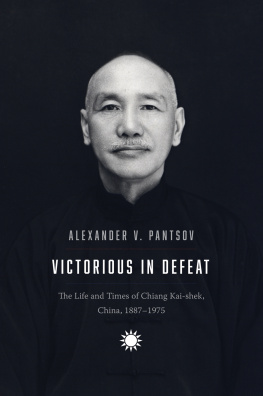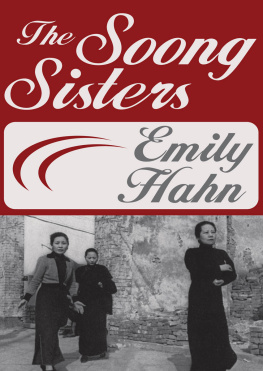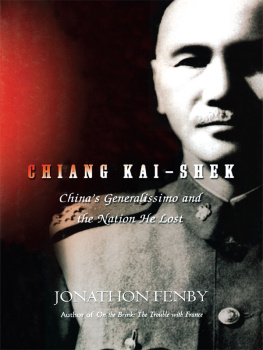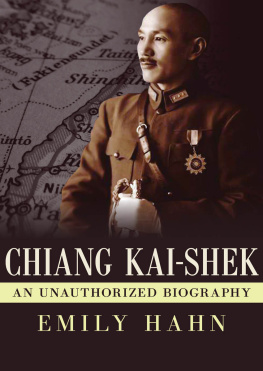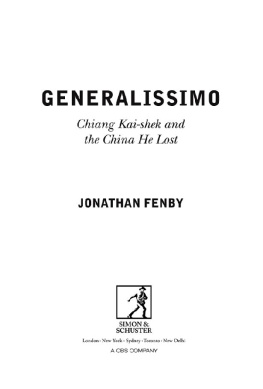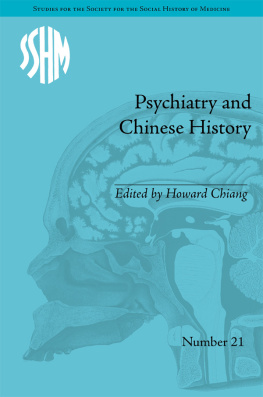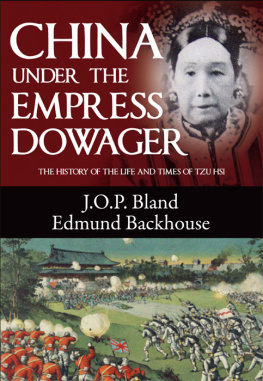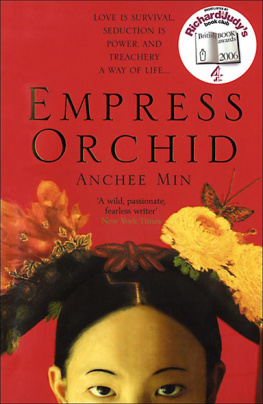
ALSO BY HANNAH PAKULA
An Uncommon Woman: The Empress Frederick:
Daughter of Queen Victoria, Wife of the Crown Prince of Prussia,
Mother of Kaiser Wilhelm
The Last Romantic: A Biography of Queen Marie of Roumania
The Last Empress

Madame Chiang Kai-shek and the
Birth of Modern China
Hannah Pakula


Simon & Schuster
1230 Avenue of the Americas
New York, NY 10020
www.SimonandSchuster.com
Copyright 2009 by Hannah Pakula
All rights reserved, including the right to reproduce this book
or portions thereof in any form whatsoever.
For information address Simon & Schuster Subsidiary Rights Department,
1230 Avenue of the Americas, New York, NY 10020
First Simon & Schuster hardcover edition November 2009
SIMON & SCHUSTER and colophon are registered trademarks of Simon & Schuster, Inc.
For information about special discounts for bulk purchases, please contact Simon & Schuster Special Sales at 1-866-506-1949 or business@simonandschuster.com.
The Simon & Schuster Speakers Bureau can bring authors to your live event. For more information or to book an event, contact the Simon & Schuster Speakers Bureau at 1-866-248-3049 or visit our website at www.simonspeakers.com .
Designed by Nancy Singer
Manufactured in the United States of America
1 3 5 7 9 10 8 6 4 2
Library of Congress Cataloging-in-Publication Data
Pakula, Hannah.
The last empress : Madame Chiang Kai-Shek and the birth of modern China / Hannah Pakula. 1st Simon & Schuster hardcover ed.
p. cm.
1. Chiang, May-ling Soong, 18972003. 2. Presidents spousesChina Biography. 3. Presidents spousesTaiwanBiography. 4. Chiang, Kai-shek,
18871975. 5. ChinaHistoryRepublic, 19121949.
6. TaiwanHistory1945 I. Title.
DS777.488.C515P35 2009
951.042092dc22
[B] 2009017576
ISBN 978-1-4391-4893-8
eISBN 978-1-4391-5423-6
The author wishes to thank the following institutions for access to material reprinted in this book, and in some cases permission to reprint material from their collections:
Georgetown University Libraries Special Collections
Hoover Institution on War, Revolution and Peace
Academia Historica/Chiang Kai-shek Archive, Taipei, Taiwan
Franklin D. Roosevelt Presidential Library/Harry Hopkins Papers
To my friend Barbara Davis,
who has always been there
AUTHORS NOTE

T HERE ARE TWO systems of translating Chinese characters into the English languageWade-Giles (developed in the mid-nineteenth century and used on Taiwan until 2009) and pinyin (a phonetic system developed by the Communists in the mid-twentieth century). Guided by what the reader is most likely to recognize and the time frame of the book, I have used Wade-Giles or common usage for names of people like Chiang Kai-shek and Sun Yatsen. I have done the same for place names like Canton and Mongolia, occasionally falling back on postal map names, and, in the interest of simplicity, have left out quite a few dashes and apostrophes.
The pitfalls of transliterating Chinese into English are only surpassed by the difficulties of converting Chinese money into American dollars. Because of the constant fluctuation of currencies, their names, and their equivalents, most amounts cited in the book are footnoted on the page with their approximate value in U.S. dollars for that year and, in parenthesis, what those dollars would be worth in 2008.
LIST OF PRINCIPAL CHARACTERS

Acheson, Dean: U.S. secretary of state in the Truman administration.
Allen, Dr. Young J.: Head of the Southern Methodist Mission in Shanghai.
Alsop, Joseph: American journalist and syndicated columnist, related to the Roosevelts.
Arnold, H. H. (Hap): The only five-star general in both the U.S. Army and U.S. Air Force.
Belden, Jack: American journalist, one of the group that walked out of Burma with Stilwell.
Blucher, Vasily Konstantinovich: Known as Galen, he was the chief Russian adviser to Chiang Kai-shek at the military school of Whampoa.
Borodin, Mikhail (real name: Mikhail Markovich Gruzenberg): Russian member of the Comintern who organized Sun Yat-sens government in the Communist style.
Brooke, Sir Alan (Lord Alanbrooke): Principal military adviser to Winston Churchill during World War II.
Burke, William B.: Charlie Soongs best friend at school in the United States and in China.
Caldwell, Oliver J.: An officer of the OSS.
Cantlie, Dr. James: A doctor and friend of Sun Yat-sen.
Carr, General Julian Shakespeare: The head of Bull-Durham Tobacco, he was Charlie Soongs benefactor in the United States.
Chang Ching-chiang (Curio Chang): Crippled art and antique dealer who befriended Chiang Kai-shek and probably paid for his second wedding.
Chang Tso-lin: Known as the Old Marshal, he was the warlord of Manchuria.
Chang Tsung-chang: A warlord known as the Monsterhuge, powerful, and none too bright.
Chen Cheng: A tough, decent Chinese general who became president of the Executive Yuan.
Chen, Jennie (Chen Chieh-ju): Chiang Kai-sheks second wife.
Chen Chi-mei: Supporter of Sun Yat-sen and patron of Chiang Kai-shek.
Chen, Eugene: Born in Trinidad, he was the brilliant editor of The Shanghai Gazette.
Chen Kuo-fu: The older of the two conservative Chen brothers, who controlled both Chiangs Kai-sheks schedule and Chinese thought.
Chen Li-fu: The younger of the Chen brothers, known together as the CC Clique.
Chennault, Anna: The first woman correspondent for Chinas Central News Agency and much younger wife of Claire Chennault. After his death, she became a figure in Republican circles of Washington.
Chennault, Claire Lee: Unofficial head of the Chinese air force, he competed with Stilwell for supplies and convinced the Chiangs that his Flying Tigers could win the war for them.
Chen Yi: Corrupt Chinese general named by Chiang as governor of Taiwan after World War II.
Chiang Ching-kuo: Chiang Kai-sheks only biological son, he was head of the Kuomintang and Taiwan after the death of his father.
Chiang Wei-kuo: Chiang Kai-sheks adopted son.
Chou En-lai: Second only to Mao Tse-tung in the Chinese Communist Party, he served as its first premier and foreign minister.
Chuikov, Vasilii I.: Chief Soviet military adviser to Chiang Kai-shek.
Chu Teh: The general who became commander-in-chief of the army of the CCP in China.
Cixi (Tzu-hsi): The dowager empress. The last powerful member of the Manchu dynasties, she ruled China from behind a yellow curtain.
Next page

